- Home
- Annie Proulx
Close Range Page 2
Close Range Read online
Page 2
I hope they eat pies better than the ones you make, said Rollo, who didn’t like the mouthful of pits that came with the chokecherries.
His interest in women began a few days after the old man had said, take this guy up and show him them Indan drawrings, jerking his head at the stranger. Mero had been eleven or twelve at the time, no older. They rode along the creek and put up a pair of mallards who flew downstream and then suddenly reappeared, pursued by a goshawk who struck the drake with a sound like a handclap. The duck tumbled through the trees and into deadfall trash and the hawk shot as swiftly away as it had come.
They climbed through the stony landscape, limestone beds eroded by wind into fantastic furniture, stale gnawed breadcrusts, tumbled bones, stacks of dirty folded blankets, bleached crab claws and dog teeth. He tethered the horses in the shade of a stand of limber pine and led the anthropologist up through the stiff-branched mountain mahogany to the overhang. Above them reared corroded cliffs brilliant with orange lichen, pitted with holes and ledges darkened by millennia of raptor feces.
The anthropologist moved back and forth scrutinizing the stone gallery of red and black drawings: bison skulls, a line of mountain sheep, warriors carrying lances, a turkey stepping into a snare, a stick man upside-down dead and falling, red ochre hands, violent figures with rakes on their heads that he said were feather headdresses, a great red bear dancing forward on its hind legs, concentric circles and crosses and latticework. He copied the drawings in his notebook, saying rubba-dubba a few times.
That’s the sun, said the anthropologist who resembled an unfinished drawing himself, pointing at an archery target, ramming his pencil into the air as though tapping gnats. That’s an atlatl and that’s a dragonfly. There we go. You know what this is; and he touched a cloven oval, rubbing the cleft with his dusty fingers. He got down on his hands and knees, pointed out more, a few dozen.
A horseshoe?
A horseshoe! The anthropologist laughed. No boy, it’s a vulva. That’s what all of these are. You don’t know what that is, do you? You go to school on Monday and look it up in the dictionary.
It’s a symbol, he said. You know what a symbol is?
Yes, said Mero, who had seen them clapped together in the high school marching band. The anthropologist laughed and told him he had a great future, gave him a dollar for showing him the place. Listen, kid, the Indians did it just like anybody else, he said.
He had looked the word up in the school dictionary, slammed the book closed in embarrassment, but the image was fixed for him (with the brassy background sound of a military march), blunt ochre tracing on stone, and no fleshy examples ever conquered his belief in the subterranean stony structure of female genitalia, the pubic bone a proof, except for the old man’s girlfriend whom he imagined down on all fours, entered from behind and whinnying like a mare, a thing not of geology but flesh.
Thursday night, balked by detours and construction, he was on the outskirts of Des Moines and no farther. In the cinderblock motel room he set the alarm but his own stertorous breathing woke him before it rang. He was up at five-fifteen, eyes aflame, peering through the vinyl drapes at his snow-hazed car flashing blue under the motel signSLEEP SLEEP . In the bathroom he mixed the packet of instant motel coffee and drank it black without ersatz sugar or chemical cream. He wanted the caffeine. The roots of his mind felt withered and punky.
A cold morning, light snow slanting down: he unlocked the Cadillac, started it and curved into the vein of traffic, all semis, double- and triple-trailers. In the taillights’ red glare he missed the westbound ramp and got into torn-up muddy streets, swung right and right again, using the motel’s SLEEP sign as a landmark, but he was on the wrong side of the interstate and the sign belonged to a different motel.
Another mudholed lane took him into a traffic circle of commuters sucking coffee from insulated cups, pastries sliding on dashboards. Halfway around the hoop he spied the interstate entrance ramp, veered for it, collided with a panel truck emblazonedSTOP SMOKING !HYPNOSIS THAT WORKS !, was rammed from behind by a stretch limo, the limo in its turn rear-ended by a yawning hydroblast operator in a company pickup.
He saw little of this, pressed into his seat by the air bag, his mouth full of a rubbery, dusty taste, eyeglasses cutting into his nose. His first thought was to blame Iowa and those who lived in it. There were a few round spots of blood on his shirt cuff.
A star-spangled Band-Aid over his nose, he watched his crumpled car, pouring dark fluids onto the highway, towed away behind a wrecker. A taxi took him, his suitcase, the homburg funeral hat, in the other direction to Posse Motors where lax salesmen drifted like disorbited satellites and where he bought a secondhand Cadillac, black like the wreck, but three years older and the upholstery not cream leather but sun-faded velour. He had the good tires from the wreck brought over and mounted. He could do that if he liked, buy cars like packs of cigarettes and smoke them up. He didn’t care for the way it handled out on the highway, throwing itself abruptly aside when he twitched the wheel and he guessed it might have a bent frame. Damn, he’d buy another for the return trip. He could do what he wanted.
He was half an hour past Kearney, Nebraska, when the full moon rose, an absurd visage balanced in his rearview mirror, above it a curled wig of a cloud, filamented edges like platinum hairs. He felt his swollen nose, palped his chin, tender from the stun of the air bag. Before he slept that night he swallowed a glass of hot tap water enlivened with whiskey, crawled into the damp bed. He had eaten nothing all day yet his stomach coiled at the thought of road food.
He dreamed that he was in the ranch house but all the furniture had been removed from the rooms and in the yard troops in dirty white uniforms fought. The concussive reports of huge guns were breaking the window glass and forcing the floorboards apart so that he had to walk on the joists and below the disintegrating floors he saw galvanized tubs filled with dark, coagulated fluid.
On Saturday morning, with four hundred miles in front of him, he swallowed a few bites of scorched eggs, potatoes painted with cannedsalsa verde, a cup of yellow coffee, left no tip, got on the road. The food was not what he wanted. His breakfast habit was two glasses of mineral water, six cloves of garlic, a pear. The sky to the west hulked sullen, behind him smears of tinselly orange shot through with blinding streaks. The thick rim of sun bulged against the horizon.
He crossed the state line, hit Cheyenne for the second time in sixty years. There was neon, traffic and concrete, but he knew the place, a railroad town that had been up and down. That other time he had been painfully hungry, had gone into the restaurant in the Union Pacific station although he was not used to restaurants and ordered a steak, but when the woman brought it and he cut into the meat the blood spread across the white plate and he couldn’t help it, he saw the beast, mouth agape in mute bawling, saw the comic aspects of his revulsion as well, a cattleman gone wrong.
Now he parked in front of a phone booth, locked the car although he stood only seven feet away, and telephoned the number Tick’s wife had given him. The ruined car had had a phone. Her voice roared out of the earpiece.
We didn’t hear so we wondered if you changed your mind.
No, he said, I’ll be there late this afternoon. I’m in Cheyenne now.
The wind’s blowing pretty hard. They’re saying it could maybe snow. In the mountains. Her voice sounded doubtful.
I’ll keep an eye on it, he said.
He was out of town and running north in a few minutes.
The country poured open on each side, reduced the Cadillac to a finger-snap. Nothing had changed, not a goddamn thing, the empty pale place and its roaring wind, the distant antelope as tiny as mice, landforms shaped true to the past. He felt himself slip back, the calm of eighty-three years sheeted off him like water, replaced by a young man’s scalding anger at a fool world and the fools in it. What a damn hard time it had been to hit the road. You don’t know what it was like, he told his ex-wives until they said they did know, he�
�d pounded it into their ears two hundred times, the poor youth on the street holding up a sign asking for work, and the job with the furnace man,yatata yatata ya . Thirty miles out of Cheyenne he saw the first billboard,DOWN UNDER WYOMING ,Western Fun the Western Way, over a blown-up photograph of kangaroos hopping through the sagebrush and a blond child grinning in a manic imitation of pleasure. A diagonal banner warned,Open May 31 .
So what, Rollo had said to the old man’s girlfriend, what about that Mr. Tin Head? Looking at her, not just her face, but up and down, eyes moving over her like an iron over a shirt and the old man in his mailman’s sweater and lopsided hat tasting his Everclear and not noticing or not caring, getting up every now and then to lurch onto the porch and water the weeds. When he left the room the tension ebbed and they were only ordinary people to whom nothing happened. Rollo looked away from the woman, leaned down to scratch the dog’s ears, saying, Snarleyow Snapper, and the woman brought a dish to the sink and ran water on it, yawning. When the old man came back to his chair, the Everclear like sweet oil in his glass, glances resharpened and inflections of voice again carried complex messages.
Well well, she said, tossing her braids back, every year Tin Head butchers one of his steers, and that’s what they’d eat all winter long, boiled, fried, smoked, fricasseed, burned and raw. So one time he’s out there by the barn and he hits the steer a good one with the axe and it drops stun down. He ties up the back legs, hoists it up and sticks it, shoves the tub under to catch the blood. When it’s bled out pretty good he lets it down and starts skinning it, starts with the head, cuts back of the poll down past the eye to the nose, peels the hide back. He don’t cut the head off but keeps on skinning, dewclaws to hock up the inside of the thigh and then to the cod and down the middle of the belly to brisket to tail. Now he’s ready to start siding, working that tough old skin off. But siding is hard work—(the old man nodded)—and he gets the hide off about halfway and starts thinking about dinner. So he leaves the steer half-skinned there on the ground and he goes into the kitchen, but first he cuts out the tongue which is his favorite dish all cooked up and eat cold with Mrs. Tin Head’s mustard in a forget-me-not teacup. Sets it on the ground and goes in to dinner. Dinner is chicken and dumplins, one of them changed-color chickens started out white and ended up blue, yessir, blue as your old daddy’s eyes.
She was a total liar. The old man’s eyes were murk brown.
Onto the high plains sifted the fine snow, delicately clouding the air, a rare dust, beautiful, he thought, silk gauze, but there was muscle in the wind rocking the heavy car, a great pulsing artery of the jet stream swooping down from the sky to touch the earth. Plumes of smoke rose hundreds of feet into the air, elegant fountains and twisting snow devils, shapes of veiled Arab women and ghost riders dissolving in white fume. The snow snakes writhing across the asphalt straightened into rods. He was driving in a rushing river of cold whiteout foam. He could see nothing, trod on the brake, the wind buffeting the car, a bitter, hard-flung dust hissing over metal and glass. The car shuddered. And as suddenly as it had risen the wind dropped and the road was clear; he could see a long, empty mile.
How do you know when there’s enough of anything? What trips the lever that snaps up theSTOP sign? What electrical currents fizz and crackle in the brain to shape the decision to quit a place? He had listened to her damn story and the dice had rolled. For years he believed he had left without hard reason and suffered for it. But he’d learned from television nature programs that it had been time for him to find his own territory and his own woman. How many women were out there! He had married three or four of them and sampled plenty.
With the lapping subtlety of incoming tide the shape of the ranch began to gather in his mind; he could recall the intimate fences he’d made, taut wire and perfect corners, the draws and rock outcrops, the watercourse valley steepening, cliffs like bones with shreds of meat on them rising and rising, and the stream plunging suddenly underground, disappearing into subterranean darkness of blind fish, shooting out of the mountain ten miles west on a neighbor’s place, but leaving their ranch some badland red country as dry as a cracker, steep canyons with high caves suited to lions. He and Rollo had shot two early in that winter close to the overhang with the painted vulvas. There were good caves up there from a lion’s point of view.
He traveled against curdled sky. In the last sixty miles the snow began again. He climbed out of Buffalo. Pallid flakes as distant from each other as galaxies flew past, then more and in ten minutes he was crawling at twenty miles an hour, the windshield wipers thumping like a stick dragged down the stairs.
The light was falling out of the day when he reached the pass, the blunt mountains lost in snow, the greasy hairpin turns ahead. He drove slowly and steadily in a low gear; he had not forgotten how to drive a winter mountain. But the wind was up again, rocking and slapping the car, blotting out all but whipping snow and he was sweating with the anxiety of keeping to the road, dizzy with the altitude. Twelve more miles, sliding and buffeted, before he reached Ten Sleep where streetlights glowed in revolving circles like Van Gogh’s sun. There had not been electricity when he left the place. In those days there were seventeen black, lightless miles between the town and the ranch, and now the long arch of years compressed into that distance. His headlights picked up a sign: 20MILES TO DOWN UNDER WYOMING . Emus and bison leered above the letters.
He turned onto the snowy road marked with a single set of tracks, faint but still discernible, the heater fan whirring, the radio silent, all beyond the headlights blurred. Yet everything was as it had been, the shape of the road achingly familiar, sentinel rocks looming as they had in his youth. There was an eerie dream quality in seeing the deserted Farrier place leaning east as it had leaned sixty years ago, the Banner ranch gate, where the companionable tracks he had been following turned off, the gate ghostly in the snow but still flying its wrought iron flag, unmarked by the injuries of weather, and the taut five-strand fences and dim shifting forms of cattle. Next would come the road to their ranch, a left-hand turn just over the crest of a rise. He was running now on the unmarked road through great darkness.
Winking at Rollo the girlfriend said, yes, she had said, yes sir, Tin Head eats half his dinner and then he has to take a little nap. After a while he wakes up again and goes outside stretching his arms and yawning, says, guess I’ll finish skinning out that steer. But the steer ain’t there. It’s gone. Only the tongue, laying on the ground all covered with dirt and straw, and the tub of blood and the dog licking at it.
It was her voice that drew you in, that low, twangy voice, wouldn’t matter if she was saying the alphabet, what you heard was the rustle of hay. She could make you smell the smoke from an unlit fire.
How could he not recognize the turnoff to the ranch? It was so clear and sharp in his mind: the dusty crimp of the corner, the low section where the snow drifted, the run where willows slapped the side of the truck. He went a mile, watching for it, but the turn didn’t come up, then watched for the Bob Kitchen place two miles beyond, but the distance unrolled and there was nothing. He made a three-point turn and backtracked. Rollo must have given up the old entrance road, for it wasn’t there. The Kitchen place was gone to fire or wind. If he didn’t find the turn it was no great loss; back to Ten Sleep and scout a motel. But he hated to quit when he was close enough to spit, hated to retrace black miles on a bad night when he was maybe twenty minutes away from the ranch.
He drove very slowly, following his tracks, and the ranch entrance appeared on the right although the gate was gone and the sign down. That was why he’d missed it, that and a clump of sagebrush that obscured the gap.
He turned in, feeling a little triumph. But the road under the snow was rough and got rougher until he was bucking along over boulders and slanted rock and knew wherever he was it was not right.
He couldn’t turn around on the narrow track and began backing gingerly, the window down, craning his stiff neck, staring into the redness cas
t by the taillights. The car’s right rear tire rolled up over a boulder, slid and sank into a quaggy hole. The tires spun in the snow, but he got no purchase.
I’ll sit here, he said aloud. I’ll sit here until it’s light and then walk down to the Banner place and ask for a cup of coffee. I’ll be cold but I won’t freeze to death. It played like a joke the way he imagined it with Bob Banner opening the door and saying, why, it’s Mero, come on in and have some java and a hot biscuit, before he remembered that Bob Banner would have to be 120 years old to play that role. He was maybe three miles from Banner’s gate, and the Banner ranch house was another seven miles beyond the gate. Say a ten-mile hike at altitude in a snowstorm. On the other hand he had half a tank of gas. He could run the car for a while, then turn it off, start it again all through the night. It was bad luck, but that’s all. The trick was patience.

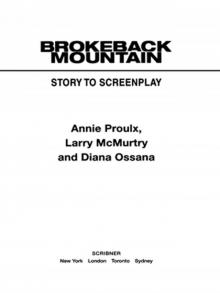 Brokeback Mountain
Brokeback Mountain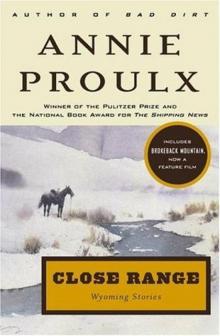 Close Range
Close Range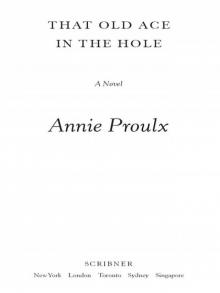 That Old Ace in the Hole
That Old Ace in the Hole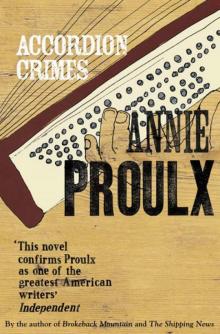 Accordion Crimes
Accordion Crimes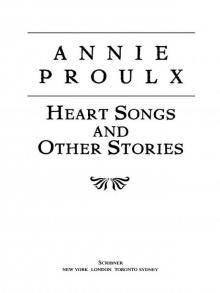 Heart Songs and Other Stories
Heart Songs and Other Stories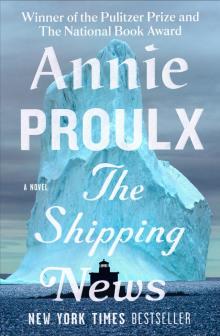 The Shipping News
The Shipping News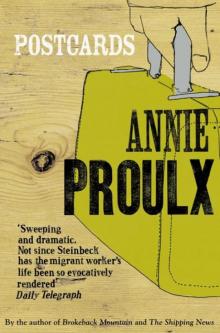 Postcards
Postcards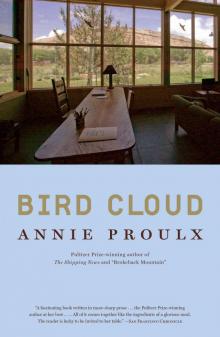 Bird Cloud
Bird Cloud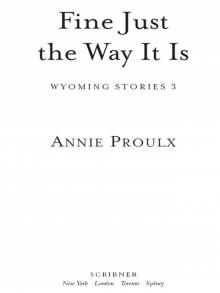 Fine Just the Way It Is
Fine Just the Way It Is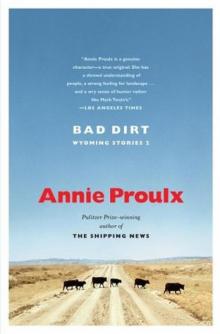 Bad Dirt
Bad Dirt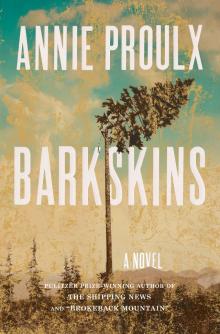 Barkskins
Barkskins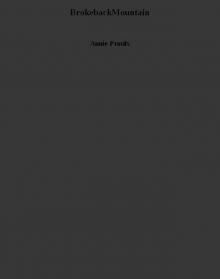 BrokebackMountain
BrokebackMountain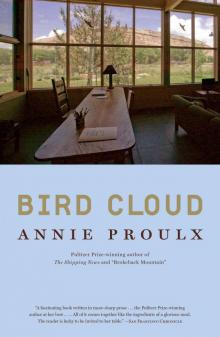 Bird Cloud: A Memoir of Place
Bird Cloud: A Memoir of Place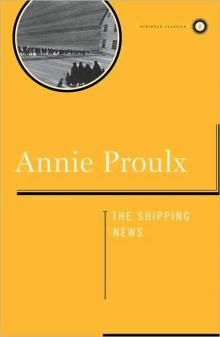 Shipping News_A Novel
Shipping News_A Novel